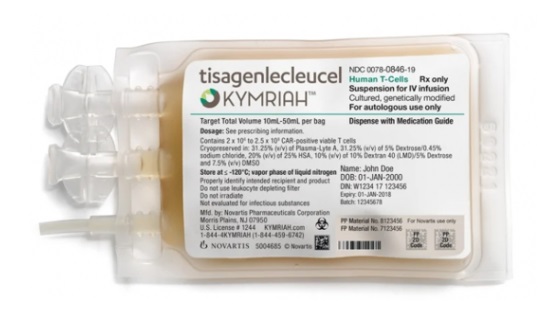The first CAR-T therapy, Kymriah (ingredient: tisagenlecleucel), failed to pass the review of a panel at the Health Insurance Review and Assessment Service (HIRA) due to its hefty price tag of 500 million won ($430,884).
According to an official at HIRA, the agency’s cancer drugs benefit appraisal committee discussed whether to grant reimbursement for Kymriah.

However, the panel refused to make the drug reimbursable because of the therapy’s low cost-effectiveness.
Kymriah is personalized immunotherapy. After T cells from a patient are taken, they are genetically recombined so that the chimeric antigen receptor (CAR) can be expressed. And then, the injection is administered back into the patient’s body.
The FDA approved Kymriah on Aug. 30, 2017, for the first time in the world, and the European Medicines Agency followed suit in August 2018, and Japan’s Ministry of Health, Labor, and Welfare, in March 2019.
In Korea, the Ministry of Food and Drug Safety granted the nod for Kymriah in March as the first novel drug applied under the Advanced Regenerative Medicine and Advanced Biopharmaceuticals Act.
Kymriah raises the chance of complete remission with a single shot, drawing much attention as an innovative treatment for terminal blood cancer patients.
However, the cost of uninsured Kymriah is about 460 million won.
In March, Novartis Korea applied for insurance benefits for Kymriah utilizing the approval-reimbursement review linkage system.
However, the therapy failed to pass the HIRA’s drug reimbursement review committee, a first step to win reimbursement, due to concerns over its impact on the national health insurance financing.
Leukemia patients urged HIRA to approve reimbursement for Kymriah as swiftly as possible.
On Tuesday, the Korea Leukemia Patients Organization (KLPO) said Japan allowed health insurance coverage for Kymriah to reduce the cost per treatment to 350 million won in May 2019. From July 2021, the drug’s price went down by 4.3 percent to 335 million won, the patient group said. “We wonder what HIRA and the Ministry of Health and Welfare did for the past six months,” KLPO said in a statement.
A single Kymriah treatment is known to give long-term survival to eight out of 10 patients with end-stage acute lymphocytic leukemia and four out of 10 patients with end-stage lymphoma, the patient group went on to say. “For terminal leukemia and lymphoma patients, reimbursement for Kymriah is like a lifeline.”
Since Kymriah is the first CAR-T treatment and can serve as a model for reimbursement for ultra-expensive therapies in the future, the government and the drugmaker should develop plans for rational health insurance spending and active cost-sharing that Kymriah could be a good precedent for a swift reimbursement.

